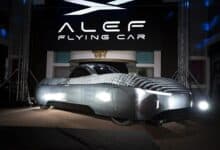How much is the Alef Aeronautics flying car?

How expensive is the flying car?
AirCar will be available globally for consumers to purchase within the next year, but Klein Vision’s spokesperson says that only licensed pilots will be eligible to actually fly it. The asking price of the innovation will range between $550,000 to $1.1 million, and will depend based on the features that the model has. Take a look at the $300,000 electric flying car with a 110-mile range in the air that just got FAA approval for test flights
Last week, the Californian automaker, Alef Aeronautics, announced that its Model A flying car has achieved a significant milestone by receiving a Special Airworthiness Certification from the Federal Aviation Administration (FAA). This marks the first time ever that a vehicle of this kind has obtained legal approval for flight from the US Government.
Exploring the Future of Transportation: FAA Flying Cars
As the FAA is in the process of developing policies for electric vertical takeoff and landing (eVTOL) vehicles, the certification comes with certain restrictions on the locations and purposes for which the car is allowed to fly.
Alef revealed in a press release back in October that they have been conducting test-drives and test-flights of a full-size prototype since 2019. Mock-up images released by Alef give an idea of what the vehicle could potentially look like. This achievement represents a significant step forward in the advancement of personal air mobility and the future of flying cars.
The Model A, an entirely electric vehicle, boasts a driving range of 200 miles and a flight range of 110 miles, according to Alef. The company emphasizes that the vehicle is designed to seamlessly integrate into existing urban driving and parking infrastructure.
Alef’s vision for the Model A is to create a vehicle that can drive on regular streets, but also has the ability to take off vertically when necessary and fly above traffic. The goal is to offer a practical solution to modern congestion issues. By utilizing their proprietary technology, the vehicle can elevate without the need for traditional runways.
Alef clarifies that the Model A is classified as a low-speed vehicle. The idea is that if a driver requires a quicker route, they can utilize the flight capabilities offered by Alef’s innovative design. This approach is aimed at providing faster and more efficient commutes for users.
Who makes Alef flying cars?
Alef Aeronautics, a startup in San Mateo, California, just received the FAA’s Special Airworthiness Certification for its Model A flying car. The company, which has yet to announce a delivery date, is asking for a $150 deporting on the $300,000 Model A. The vehicle features a drone-like internal propellers and a promised range of 200 miles over land and 110 in the air. The certification notes that this is not the first aircraft of its kind, but Alef claims primacy as the first driveway-friendly, road-going EV with vertical take-off and landing capabilities. The flying car has arrived—to the next development phase.
The government calls this type of flying an eVTOL, or electric vertical takeoff and landing aircraft. (These are what’s found in Back to the Future: Part 2, the very movie that inspired Alef’s founders.) A sci-fi infatuation is common at flying car start-ups: These are dreamers and moonshot engineers, not your everyday urban planners. In the Tech Age, “flying cars” represent a hot investment sweetened by the romance of an unfulfilled Space Age promise. But how many proposed Jetsonmobiles are closer to dealers’ lots than napkin sketches?
The most legitimate end of the market has a different mission than Alef, whose Model A is meant for private ownership and personal use on the road and in the sky. Most eVTOLs near production will be part of a service to ferry passengers from airports to city centers over traffic, not through it. Hyundai subsidiary Supernal promises production of its SA-1 eVTOL by 2028, with full autonomous flight as part of ecosystem of urban travel that combines cars, planes, scooters and all in-between. Hyundai’s multifarious manufacturing expertise makes this timeline possible, as does a collaboration with robot-dog-maker Boston Dynamics.
Joby Aviation is a rarity among eVTOL start-ups: It has a production aircraft, a $131-million government contract, and investment from Toyota, Uber, and JetBlue. This June the company received FAA approval to flight test its first production prototype aircraft, and its stock—released in 2021 via a SPAC—soared. The Joby aircraft has six rotors, and in a trial, flew 155 miles on a single charge. If all goes to plan, Joby will deliver units to the US Air Force next year, making it the first eVTOL delivered.

